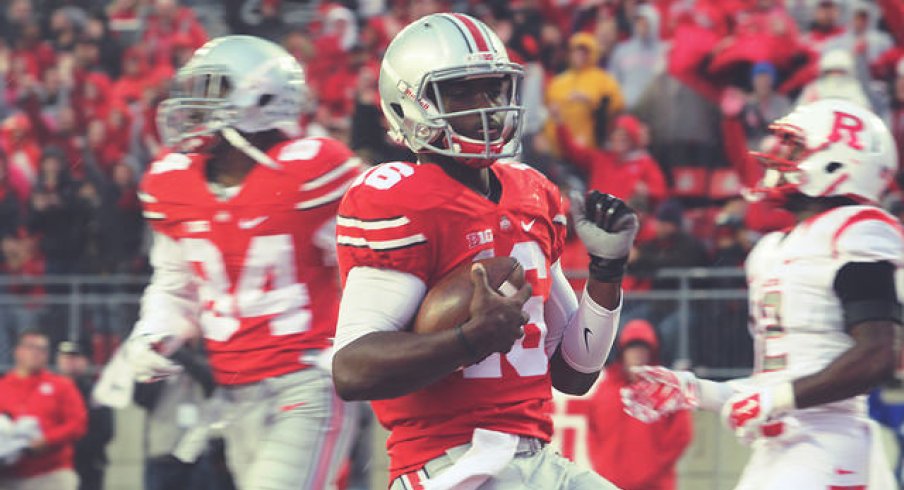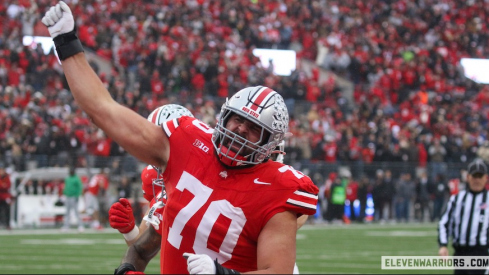Ohio State fans were disappointed that J.T. Barrett was not invited to the Heisman ceremony. No one expected that Barrett would win the trophy in what amounted to a coronation ceremony for Oregon quarterback Marcus Mariota. However, learning that Barrett placed fifth in the Heisman vote on total points would have made a Heisman ceremony invitation seem appropriate.
While Barrett was not a feature of the telecast on Saturday night, his fifth-place finish is still rather unique in the history of the Heisman Trophy. Barrett is only the sixth freshman to place in the top ten of the Heisman standings without having won it in the same year, which excludes recent winners Johnny Manziel and Jameis Winston. The accompanying table suggests he's in great company.
| Year | Name | Place | Points | Winner | Winner's Points |
|---|---|---|---|---|---|
| 1942 | Clint Castleberry | 3rd | 99 | Frank Sinkwich | 1059 |
| 1980 | Herschel Walker | 3rd | 683 | George Rogers | 1128 |
| 1987 | Emmitt Smith | 9th | 70 | Tim Brown | 1442 |
| 1999 | Michael Vick | 3rd | 319 | Ron Dayne | 2042 |
| 2004 | Adrian Peterson | 2nd | 997 | Matt Leinart | 1325 |
| 2014 | J.T. Barrett | 5th | 78 | Marcus Mariota | 2534 |
Casual football fans are probably aware that freshmen were not eligible to play college football as we know it until 1972. Their activities were confined to freshmen teams that approximated junior varsity squads. This change coincided with the arrival of Archie Griffin to the college football landscape. Griffin would break a 27-year-old single-game school rushing record as a true freshman and set multiple NCAA rushing records in the following three years. His distinctions of 31-consecutive 100-yard rushing games and two Heisman trophies still stand.
However, the history of freshmen in college football during the Heisman era does not begin with the likes of Archie Griffin in 1972. It begins in World War II when the sport was still in its adolescence, if not its infancy. World War II saw an attrition of talent from college football toward the war effort in Europe and the Pacific. Allowing freshmen to play was a stopgap for the NCAA during the war.
During this time, college football saw its first freshman phenom. Clint Castleberry had the first breakout freshman season in NCAA while playing for the Georgia Tech Yellow Jackets.
Details of Castleberry's fabled season for Georgia Tech are sparse, given the time, the area, and the technology available. Speed and agility were hallmarks for Castleberry, who, according to an Atlanta Constitution report of Georgia Tech's season opener against Auburn, ran so fast on punt coverage that he beat the punt to Auburn's return man. Both waited for the punt to arrive to the Auburn return man, upon which Castleberry tackled him on the spot.
However, this alone was insufficient to get him Heisman consideration. Heismans, during this time, were won or lost by or against Notre Dame. Georgia Tech took just 31 players on a train trip from Atlanta to South Bend to play the Irish after the season-opener against Auburn. In that game, Castleberry stole the show en route to a 13-6 Georgia Tech win.
Better yet, he showed up junior sensation, Notre Dame's Angelo Bertelli. Bertelli had made Heisman history the year earlier as the first sophomore to place in the Heisman standings. He finished second in the 1941 ballot, just 209 points behind Minnesota's Bruce Smith. Bertelli won the Heisman as a senior in 1943.
Castleberry led the charge for Georgia Tech en route to a 9-0 start before losing 34-0 to Georgia in the finale. Voters for the Heisman Trophy Trust, then in its eighth year, placed Clint Castleberry third in the Heisman point standings. Frank Sinkwich of rival Georgia won the trophy that year.
Sadly, Castleberry never got the chance to do what Angelo Bertelli did: wait and earn the award as an upperclassmen. The next year, Castleberry enlisted in the war effort, trained as a pilot, and was stationed in Liberia. His goal, from all outward appearances, was to return to Georgia Tech after the war and finish what he had started.
This never came to fruition. Castleberry was part of a two-crew mission to ferry aircrafts from Roberts Field in Liberia to Dakar in Senegal on November 7, 1944. Neither the crew nor the planes were ever seen again. Castleberry was declared killed on November 23, 1944, with no body ever recovered.
The freshmen-eligibility rules were rescinded after the war had ended and would not be reinstated until 1972. Around this time, the Heisman Trophy became exclusively an upperclassmen trophy and was often biased toward seniors. From 1950 to 1979, just six sophomores would land in the top ten of the overall Heisman point standings. Most of these guys, like Illinois' J.C. Caroline in 1953, were afterthoughts and placed over 1000 points behind the eventual winner. Many top ten standings in a given year were comprised of all seniors.
During this time, Archie Griffin had the best placement of any sophomore in the Heisman standings. His 326 points in 1973 were the second-most for any sophomore at the time, behind Angelo Bertelli's second-place finish in 1941. That teammates John Hicks finished second and Randy Gradishar finished sixth made Griffin's finish a bit more unique.
Herschel Walker may not be the first freshman sensation in college football history, but he might be the first name mentioned by a casual football fan. Walker had one of the most heralded true-freshman debuts ever at Georgia. He finished third in the Heisman standings with 683 points, just 445 points behind eventual winner George Rogers.
Walker was a great freshman who benefited from playing on a great team. Georgia finished 12-0 in 1980 and were the consensus national champions. Still, Walker's debut is the stuff of legend for Georgia fans. Down 15-2 at halftime to Tennessee in the season-opener against Tennessee, Vince Dooley subbed in his true freshman. Walker rewarded Dooley's gamble by trucking All-American safety Bill Bates on a 16-yard touchdown run, the first of Walker's career. It was capped by Larry Munson's famous radio call "My God, a freshman".
That run foretold many more to come in Walker's career. Walker later won the trophy as a senior in 1982.
The next two freshmen to place in the Heisman standings are interesting footnotes. Emmitt Smith finished ninth in the Heisman standings in 1987 with just 70 overall points. Tim Brown, who won it that year, had 1442 points.
Twelve years later, redshirt freshman Michael Vick placed third in the 1999 Heisman standings with 319 votes. However, that year was one of the most lopsided wins in Heisman history with Ron Dayne, the winner, securing 2,042 points.
The only other freshman to be a credible threat to win the Heisman before Johnny Manziel's 2012 campaign was Adrian Peterson in 2004. Peterson was a once-in-a-generation phenom at Oklahoma when he debuted. He was the rare football prospect who was, perhaps without hyperbole, built for professional football when he enrolled in college.
Peterson was also on a team quarterbacked by the reigning Heisman winner, Jason White. Over the course of the season, the team became more about the freshman than the fifth-year senior. Peterson set an NCAA record for most 100-yard rushing games by a freshman (11), which included a 240-yard game against Baylor.
Whether Peterson could have won it was a matter of debate. Matt Leinart won the trophy in 2004 by 328 points over Peterson, who finished second with 997 points. Jason White, Peterson's quarterback, finished third in the Heisman standings with 957 points. Much like John Hicks, Archie Griffin, and Randy Gradishar may have taken votes from each other, Jason White may have siphoned votes from Adrian Peterson that year.
An award so patently biased toward upperclassmen became an award fixated with youth and surprise performers on relatively short notice. Tim Tebow became the first sophomore winner of the trophy in 2007. Sophomores Sam Bradford and Mark Ingram followed him as Heisman winners in 2008 and 2009. Johnny Manziel became the first freshman to win the trophy in 2012. Jameis Winston, another redshirt freshman, won the award last year.
J.T. Barrett broke no real ground in placing fifth in the Heisman standings this year. His placement followed two years in which freshmen won an award historically designated for upperclassmen. However, Barrett's finish in the Heisman standings is still unique and worth celebrating. Barrett is just the sixth freshman to place as a runner-up in the Heisman standings.
Of the six freshmen to place in the Heisman standings without winning it, only one later won it. This was Herschel Walker, who finished third in the ballots in 1980 and won it as a senior in 1982.
One of the six, Georgia Tech's Clint Castleberry, died in World War II and became one of the great "what if?" stories in college football history.
Three others (Emmitt Smith, Michael Vick, and Adrian Peterson) have a combined 18 Pro Bowl appearances.
The last of the six is J.T. Barrett, whose story is yet to be written.


